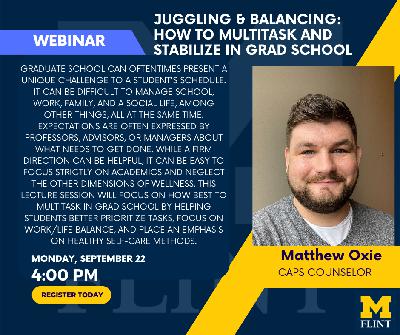Communicate with Confidence: Tips for Graduate Student Success
Description
Effective communication isn't just a buzzword; it's a core skill for success in graduate school and in life. In the latest Victors in Grad School episode, "Communicating Your Needs with Confidence," Dr. Christopher Lewis and Reilly Chabie tackle a challenge every grad student encounters: advocating for yourself and expressing what you truly need to thrive.
Reilly Chabie, a regular contributor, dives deep into why communication matters—not only academically but across every dimension of wellness. She introduces listeners to the "balancing act" every student faces, emphasizing the Eight Dimensions of Wellness (emotional, environmental, physical, etc.) and how imbalances can directly impact our ability to communicate effectively.
Stress, a common companion for grad students, gets special attention. Reilly details how physical, emotional, and cognitive symptoms of stress can interfere with clear communication—reminding us that a little stress is normal, but chronic stress can sow confusion and erode confidence. Knowing yourself and recognizing when stress is impacting your communication is the first step toward improvement.
The podcast unpacks common barriers to effective communication. From emotional dysregulation and lack of trust, to power dynamics, cultural differences, imposter syndrome, and assumptions, Reilly paints a honest picture of challenges students face daily. She references "The Four Horsemen" communication pitfalls (criticism, contempt, defensiveness, and stonewalling), illustrating why learning new healthy habits is vital.
Listeners are guided through the spectrum of communication styles—passive, aggressive, passive-aggressive, and assertive. The goal? To build assertive communication skills that foster respectful dialogue and collaborative problem-solving. Reilly provides actionable tips: plan ahead, create the right environment for conversations, use "I" statements, pay attention to nonverbal cues, and actively listen—not just talk.
Perhaps most compelling is the discussion around boundaries. Setting and communicating personal limits is crucial to self-advocacy and maintaining healthy relationships in grad school.
If you're navigating group projects, research collaboration, or simply balancing multiple life roles, this episode is packed with insights and practical advice. Whether you're a new student or a seasoned grad, you'll find wisdom that applies beyond the classroom.
Ready to advocate for yourself and build confidence in your communication? Listen to this episode and start your journey toward more effective, fulfilling conversations—both in and outside grad school.
Looking for actionable communication resources? Don't miss this episode—you'll be glad you did!
TRANSCRIPT
Dr. Christopher Lewis [00:00:01 ]:
Welcome to Victors in Grad School, where.
Dr. Christopher Lewis [00:00:03 ]:
We have conversations with students, alumni and.
Dr. Christopher Lewis [00:00:06 ]:
Experts about what it takes to find success in graduate school.
Dr. Christopher Lewis [00:00:11 ]:
Hello and welcome. Thanks so much for being here today. I'm Dr. Lewis, the director of graduate programs here at the University of Michigan, Flint. Really excited that you're here today because today we're going to be talking about a really important topic. We're going to be talking about about the importance of communicating and advocating for yourself. Because as a graduate student, you definitely have to be able to advocate for yourself and you gotta be able to talk to people and tell people what you need to be able to be successful in this graduate school journey that you're on. And today we got a great guest with us.
Dr. Christopher Lewis [00:00:51 ]:
Riley Chaby is with us again. And I'm really excited to have Riley here today to talk about this really important topic with you. So I'm going to turn it over to her. Riley, thanks so much for being here today.
Reilly Chabie [00:01:02 ]:
Absolutely. Thank you so much for the introduction, Dr. Lewis. I appreciate it. And as Dr. Lewis mentioned, communicating your needs is a crucial part of not only being a graduate student, but also just kind of existing in the world. So I hope today's presentation is helpful in all contexts of your life. To kind of get started, we'll go over a brief overview as to what you can expect.
Reilly Chabie [00:01:26 ]:
We're going to talk a little bit about something I like to call the Balancing act of just being a Graduate Student. That'll come up here shortly. I'm going to talk about why does communication matter? Just kind of brief things that are related to you as a graduate student, but also just why communication matters in the grand scheme of life. We're going to talk about some barriers that we might experience for effective communication. And then we're going to learn how to communicate with confidence, some tips, tricks, things to kind of consider in order to navigate these challenges. All right. It would not be a CAPS presentation if we didn't talk a little bit about the eight dimensions of wellness. If you've ever seen any of my presentations before, you have definitely seen me talk about these dimensions.
Reilly Chabie [00:02:18 ]:
And interestingly enough, most of U of M Flint's Division of Student affairs programming focuses and aims to provide supports that relate to these eight dimensions of wellness, which interest. Interestingly enough, my conversation today does relate to the eight dimensions of wellness. So very briefly, the eight dimensions of wellness essentially creates a visual representation of all of the aspects that make us up as a person. So we all have. And kind of looking at the wheel on my screen Here we all have emotional connections, we have environmental connections, physical connections, so on and so forth. And all of these areas require our attention at any given point during our day to day functioning. That kind of leads into this balancing act that while you're functioning as a graduate student, you are absolutely trying to balance all of these dimensions in a way that makes you kind of feel fulfilled, makes you feel like you're achieving the things that you want to achieve, and ultimately you utilize these to kind of guide your everyday decisions. Now, a big part of this is that if any of these dimensions are feeling a little out of whack or we feel like we're not engaging in them as much as we would like to, that does disrupt our general functioning, which can very easily lead to a lot of different frustrations and truthfully plays a large role into why we struggle with communicating the things that we need.
Reilly Chabie [00:03:59 ]:
Right. That I might not know that I'm physically hurting until I really think about it. It. And if I don't take care of that physical nature, I might be more irritable or you know, struggling in a particular area and having a hard time communicating that. So it's helpful to kind of put this into context with our communication patterns and this knowledge will kind of help us. What's the right word? It's going to help us identify what needs we actually have and really play into the types of communications that we need to provide. So kind of keep that in mind as we move forward here. I also want to touch a little bit on stress symptoms specifically, because if we're considering how the eight dimensions of wellness allow us to function, and when one of them isn't being focused on as much or is struggling in some context, we ultimately will experience some level of stre.
Reilly Chabie [00:05:03 ]:
And the symptoms and kind of definitions on your screen here also help us to see when our communication is not being effective. Right. That if we're not communicating as deeply or as importantly as we'd like to be, we might experience chronic stress. So a brief definition of stress. This is our physical, emotional and cognitive reactions to certain demands, threats, or just changes in our daily routines. And I bet you anything as a graduate student, you have a lot of changes going on on your day to day experience. Whether you're in classes, going to work, studying, maybe taking care of kiddos, just trying to navigate all of these different roles, you absolutely are going to have differences and changes in your routine when these things happen, though, we might experience some level of stress. I think it's important to note that general levels of Stress or are actually pretty okay.
Reilly Chabie [00:06:05 ]:
Stress can be a really big motivating factor in how we navigate the world and ultimately leads to kind of doing our best work. Sometimes that, you know, for example, if I was stressed about giving this presentation, I might work really hard to provide you the best material. Right. And make sure that I'm providing things that would be helpful for this. But the issue becomes when we experience these stress system, excuse me, symptoms intensely and chronically. So it's not just a here and there experience, but more so it's every day or every other day, or it's so intense that we feel like we can't function in a way that helps us navigate the world. So some of the things that you want to look out for are your physical symptoms. So those could be sleeping problems, muscle aches, headaches, frequent colds.
Reilly Chabie [00:07:02 ]:
Our immune system is affected by our stress levels or increased heart rate. Emotionally, you might notice some anxiety, depression, loneliness, low self esteem. And then cognitively or kind of in
























